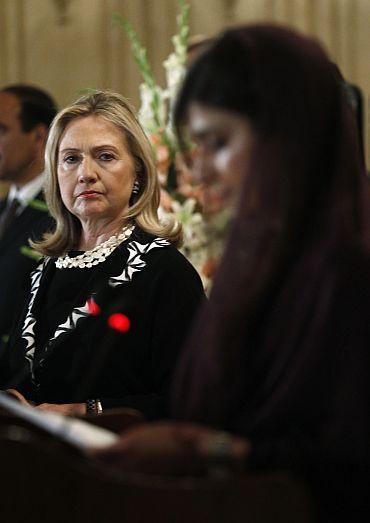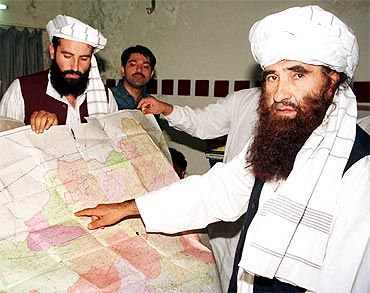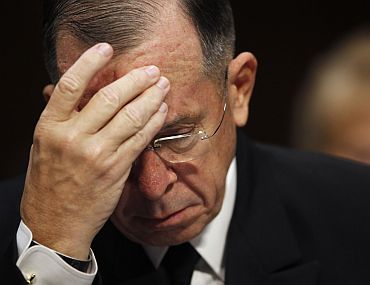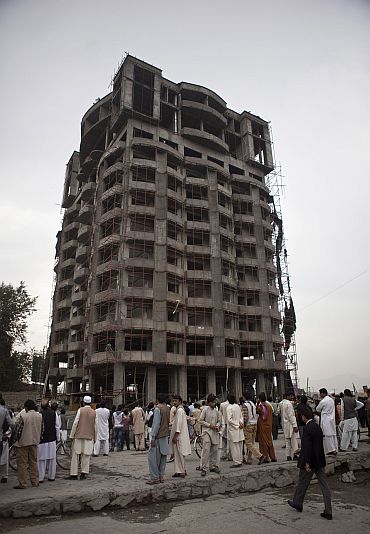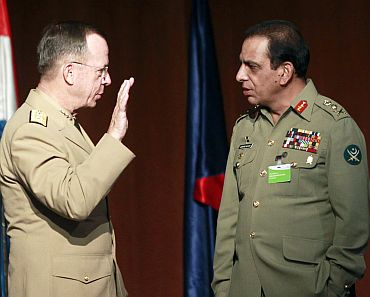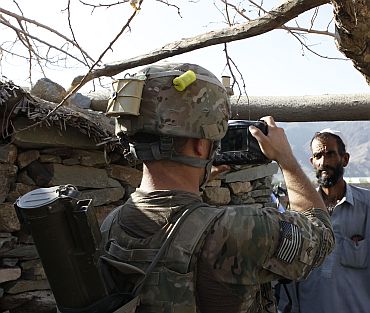 | « Back to article | Print this article |
Why the Haqqani network continues to escape US terror tag
The US is keeping the doors open for negotiations with the terror group as the Afghan endgame plays out, says Amir Mir reporting from Islamabad.
Despite being blamed for the September 13, 2011, attack on the American embassy in Kabul, the deadly Haqqani network is most likely to remain branded by the United States as an insurgent group rather than being officially designated as a 'foreign terrorist organisation' mainly because Washington simply cannot afford to exclude from peace talks a powerful Afghan militant group which has a key role in determining the shape of the Afghanistan that American troops will leave behind.
During her recent visit to Pakistan, US Secretary of State Hillary Clinton changed the sharp edge of the much-touted US policy for a more conciliatory stance towards Pakistan's aggressive response to demands that it attack North Waziristan and oust the Haqqani network from there.
Instead, she proposed that Pakistan facilitate American peace talks with the two kinds of Taliban (Pakistani and Afghan) and the Haqqani network, saying America had no evidence that Pakistan's Inter Services Intelligence was hand-in-glove with the Haqqanis or that the ISI had encouraged them to attack US-Nato targets in Afghanistan.
Well-informed diplomatic circles in Islamabad say this is a significant change of attitude and Clinton's powerful delegation stood guarantee to it: Central Intelligence Agency Director General David Petraeus, Special US Representative for Afghanistan and Pakistan Marc Grossman, US Ambassador to Pakistan Cameron Munter, US Chairman Joint Chiefs of Staff General Martin Dempsey and Assistant to the President and Deputy National Security Advisor Lieutanant General Edward Lute who oversaw the killing of Osama bin Laden in Abbottabad.
Please click NEXT to read further...
A terrorist tag would make it impossible to hold talks with the Haqqanis
In a rather bitter-sweet message, Hillary Clinton asked Islamabad to start dismantling militant safe havens along the Afghan border within days and weeks, but said the United States respected Pakistan's sovereignty and would not undertake any unilateral action against terrorists on its soil.
Before travelling to Pakistan, Hillary had told Reuters on October 11: 'We view the Haqqanis and other of their ilk as, you know, being adversaries and being very dangerous to Americans, Afghans and coalition members inside Afghanistan, but we are not shutting the door on trying to determine whether there is some path forward,' she said so when asked if she believed members of the Haqqani network might reconcile with the Afghan government.
Hillary actually extended the informal offer of peace talks at a crucial time when the US State Department is under pressure because of its reluctance to officially designate the Haqqani group as a terrorist organisation.
The Obama administration's changing stance shows that the Americans don't want to close the door on negotiations since a terrorist tag would make it impossible to hold talks with the Haqqanis, as that would violate American criminal law.
Please click Next to read further
The White House has backed away from Admiral Mullen's assertions
Therefore, despite a blunt declaration last month by Admiral Mike Mullen, then chairman of the US Joint Chiefs of Staff, that the lethal network was 'a veritable arm of Pakistani Inter Services Intelligence which exports violent extremism to Afghanistan' the US has not yet tagged the Haqqanis a terrorist organisation.
The White House has already backed away from the assertions of Mullen, the top US military officer until his retirement last month. As Hillary Clinton returned to Washington, the US State Department said on October 26, that Pakistan and the United States have agreed on a framework for holding direct talks with the militants and are now working to operationalise the plan.
At a press briefing, two State Department officials explained what the secretary meant when she said in her recent interviews that the US and Pakistan had agreement on 90, 95 per cent of issues they confronted.
They said the US, Pakistan and Afghanistan had already an understanding on holding a dialogue with the Afghan Taliban militants and Pakistan has to play its part in this by encouraging reconciliation.
On the other hand, Sirajuddin Haqqani, the elusive chief of the Haqqani network, a key component of the Taliban-led Afghan insurgency, claimed in an October 3 interview with the BBC, that he had been approached by the United States to join the Afghan government. 'Right from the first day of the American arrival till this day, not only Pakistani but other Islamic and other non-Islamic countries including America, contacted us and they are still doing so. They are asking us to leave the ranks of Islamic emirates, he said, referring to the Taliban leadership.' He said the outsiders promised an important role in the government of Afghanistan.
While confirming Sirajuddin Haqqani's claim, The Wall Street Journal had reported on October 5 that senior US officials secretly met with leaders of the Haqqani network this summer in an effort to draw them into talks on winding down the war.
The report quoted some senior US officials as saying there had been at least one meeting over the summer between Haqqani representatives and US officials, which was set up by the ISI.
Please click Next to read further
The Haqqanis to stay off the US terror list for now
The US military leadership has repeatedly blamed the Haqqani network for most of the terrorist attacks on international forces stationed in Afghanistan, and on September 29 the US Treasury department imposed sanctions on Sirajuddin Haqqani and several other group leaders on in the wake of the September 13 attack in Kabul.
'These financiers and facilitators provide the fuel for Afghan Taliban, the Haqqani Network and Al Qaeda to realise their violent aspirations,' David Cohen, the under secretary of the US Treasury for Terrorism and Financial Intelligence, said in a statement.
Yet the move has failed to dissipate mounting pressure on the White House to place the Haqqani group, whose attacks threaten to become a major obstacle to US hopes for a smooth withdrawal from Afghanistan, on the State Department's list of designated terrorist organisations.
Responding to growing demands from American lawmakers to tag the Haqqani network as a terrorist group, Clinton on September 28 said the United States was close to a decision on whether it makes such a declaration.
'We are in the final, formal review that has to be undertaken to make a government-wide decision to designate the network as a foreign terrorist organisation,' Clinton told reporters in Washington. Veteran US lawmakers like Senators Democrat Dianne Feinstein, the head of the Senate Intelligence Committee, and Carl Levin, chairman of the Senate Armed Services Committee, had urged Clinton to put the Haqqani network on the terrorism blacklist, saying there was no question it merited inclusion.
However, in making the October 11 statement suggesting the US wants to keep its options open for a deal with the militant groups as it seeks peace in a region known for historic merry-go-round of political and military alliances, Clinton has indicated the Haqqanis will stay off the terrorist list in the near future, mainly because Washington considers it as being in the strongest position among militant groups to unravel the American plan of stabilising Afghanistan before the scheduled withdrawal next year.
Please click Next to read further
The Pakistani military considers the Haqqanis a strategic asset
In contrast to the American perception of the Haqqanis, the Pakistani military and intelligence establishment considers the group a strategic asset.
Their relationship is several decades old and is also mutually beneficial. Unlike the Tehrik-e-Taliban Pakistan (Pakistan Taliban), the Haqqanis have no grouse against Islamabad; their goal, instead, is to have a stake in the dispensation of Kabul once the Americans leave.
Considering that 15,000 fighters are said to be under the control of the Haqqani network, a necessary factor for forging a peace settlement in Afghanistan is either their weakening or cooperation.
A weakened Haqqani network would also mean less leverage for Pakistan to influence events in Kabul.
With India on the east, Pakistan does not want a hostile regime in the west. This is why Pakistani army commanders, at a September meeting led by army chief General Ashfaq Kiyani, categorically ruled out a military offensive against the Haqqani network.
In addition, the generals say that yet another operation in Pakistan -- that too under the American pressure -- would alienate the Pakistanis.
After being branded by the Americans as a charitable arm of the ISI, Sirajuddin claimed in his October 3 interview with the BBC that his group did not kill former Afghan President Burhanuddin Rabbani and denied any links with the Pakistani spy agency.
He claimed that the Islamic Emirate, the name given to the Taliban government when they assumed power in Afghanistan in 1996, was behind the attack on the US embassy, NATO headquarters and other attacks in Kabul, which he said were actually ordered by a Taliban military council.
Please click Next to read further
The Haqqanis will determine the kind of Afghanistan the US leaves behind
Asserting that the game being played by the West... is close to an end, Sirajuddin Haqqani said, 'For every operation we get the order, planning and financial resources from the Taliban Emirate leadership and we act accordingly.'
The chief of the Haqqani network pledged loyalty to the 'amir' of the Afghan Taliban, Mullah Mohammad Omar, saying, 'He is our leader and we totally obey him.'
But despite Sirajuddin's allegiance to the Afghan Taliban, most analysts believe that it is his network which will eventually determine the kind of Afghanistan the Americans leave behind.
And probably that's why, they say, the US has not yet declared the Haqqani network a foreign terrorist organisation, as was the case with the Afghan Taliban.
The Islamic Movement of Taliban or Tehrik-e-Islami Taliban, (the Quetta Shura or Afghan Taliban) was designated as a FTO under the US Treasury Department's Executive Order No 13224, which was issued on September 23, 2001.
The current status of the Haqqani network as an insurgent group allows the White House to hold talks without breaking American criminal law -- unless, like the Afghan Taliban, it is declared a terrorist outfit.
